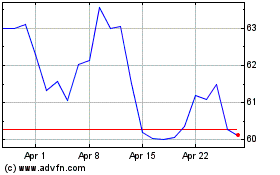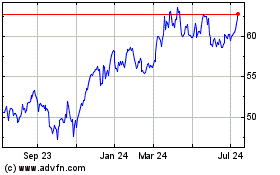China's Qihoo 360 Moving Closer to $9 Billion Buyout
December 01 2015 - 9:50AM
Dow Jones News
China's Internet companies are rewarding the faithful among U.S.
investors as progress on China's biggest ever buyout deal signals
more deals likely to go through.
An investor group, led by Chairman Zhou Hongyi, is nearing a
definitive agreement to pay $9 billion to buy out Qihoo 360
Technology Co. at around $77 per share for the U.S.-listed Chinese
Internet security company, according to people familiar with the
matter.
Qihoo 360 was the biggest of a wave of buyout offers made
earlier this year while Chinese stocks were soaring. The buyout
groups bet they could take private Chinese companies that traded in
U.S. and list them in China at much higher valuations.
The crash of the mainland Chinese stock markets this summer
sparked doubt among investors that the deals would go through.
Spreads on announced take-private offers, which were nonbinding,
widened dramatically with some stocks, including Qihoo 360, trading
at almost half of the offer prices.
Investors who hung around have been rewarded. Prospects have
brightened as a frantic effort by Beijing halted the decline and
regulators reopened the domestic initial public offering market
after a freeze on new listings in July.
The closely watched relisting of Chinese outdoor advertising
display firm Focus Media Holding Ltd., which was taken private from
Nasdaq in 2013, also boosted optimism that the buyouts would get
done.
That deal, which was the first major successful relisting
domestically, values Focus Media at more than twice its $2.6
billion valuation when it was taken private by a cluster of
private-equity funds, including Carlyle Group LP. Despite the
selloff in China, shares there trade at far higher valuations than
in the U.S.
Investors betting on Chinese stocks listed in the U.S. have also
gotten a boost from their inclusion in heavily tracked stock
indexes. Benchmark provider MSCI Inc. decided in November to add
more than a dozen U.S.-listed Chinese stocks, including Alibaba
Group Holding Ltd. and Qihoo 360, for the first time in the MSCI
Emerging Markets Index, the MSCI China Index and other indexes that
cover China, such as the MSCI AC World Index. For example, Chinese
search leader Baidu Inc., which sports a $72 billion market cap, is
up more than 60% from its September lows.
The $9 billion Qihoo 360 proposed buyout is expected to be
completed in the coming weeks with financing from a mostly domestic
investor group, the people familiar with the matter said. China's
largest Internet security company has enlisted Chinese wealth
management firms to help raise funds for the buyout and plans to
relist shares on a Chinese domestic stock exchange soon after a
deal is completed, likely via a reverse merger, according to the
people. The idea is that the company would fetch a higher valuation
in its home market.
An offer by the Internet-services provider of $77 per share
would be a 13.4% premium to Monday's closing price of $67.90 a
share. The company's shares traded below $45 in September as the
Chinese stock market bottomed and investors feared that the
potential buyers would lose their appetite for the deal.
Shares of the company have bounced back in recent weeks, along
with other U.S.-listed Chinese Internet companies. Qihoo 360
chairman Zhou Hongyi and a clutch of investors including
venture-capital firm Sequoia Capital China and Chinese brokerage
firm Citic Securities Co. made a nonbinding proposal for
$77-a-share in June.
Because the Qihoo 360 offer, like the more than a dozen made for
U.S.-listed Chinese companies earlier this year, was nonbinding,
Mr. Zhou's buyout group could have altered the terms of the offer,
or withdrawn it. Other investors in the consortium include boutique
investment bank China Renaissance Holdings Ltd. and Golden Brick
Capital Private Equity.
Buyout groups for E-House (China) Holdings Limited and Mindray
Medical International Ltd. this summer lowered their privatization
prices as China's market tumbled and initial public offerings were
halted.
The original $9 billion Qihoo 360 offer was made in June at the
height of China's stock market boom, when frothy valuations in
China's domestic stock market lured the managers of U.S.-listed
Chinese companies to embark on such proposed take-private deals
with the aim of listing back home.
Valuations for domestically listed technology companies in China
have since come down, and few of the take-private offers have been
completed so far this year, leaving investors skeptical about the
remaining nonbinding bids. Many of those deals still involve shares
trading at a steep discount. Still, tech valuations in China are
much richer than for U.S.-listed China technology companies.
The offer would reward early investors in Qihoo 360, which
listed shares in New York at $14.50 each in 2011. Qihoo 360's
shares traded as high as $120 a piece in 2014. Qihoo 360 is one of
the more natural candidates for returning to China's domestic
market.
Some other Chinese take private deals have been making progress
toward completion. WuXi PharmaTech (Cayman) Inc. entered into a
definitive agreement with investors Aug. 14 to go private, moving
the $3.3 billion buyout deal closer to completion.
On Monday, China's iKang Healthcare Group Inc. said it received
a competing buyout offer from a Chinese company with backing from
Sequoia Capital China and that would offer a higher price than a
deal offered by its founder in August.
Write to Rick Carew at rick.carew@wsj.com and Wei Gu at
wei.gu@wsj.com
Subscribe to WSJ: http://online.wsj.com?mod=djnwires
(END) Dow Jones Newswires
December 01, 2015 09:35 ET (14:35 GMT)
Copyright (c) 2015 Dow Jones & Company, Inc.
Nasdaq (NASDAQ:NDAQ)
Historical Stock Chart
From Mar 2024 to Apr 2024

Nasdaq (NASDAQ:NDAQ)
Historical Stock Chart
From Apr 2023 to Apr 2024
